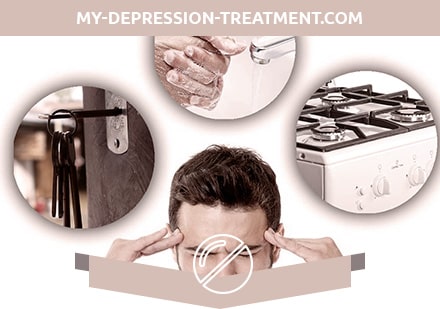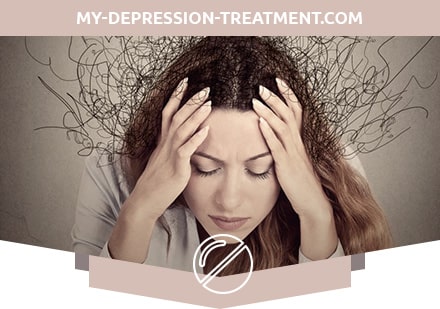
Obsessive-Compulsive Disorder
Introduction
A. Definition
Obsessive-Compulsive Disorder also called as OCD is among the most incapacitating mental illnesses described as the manifestation of compulsions and obsessions.
OCD affects two percent of the entire population where women are at slightly higher risk than males. Though the symptoms of Obsessive-Compulsive Disorder start to show gradually but about one-fourth of people with OCD can display them during early adolescence.
B. Obsessions
Obsessions can be defined as invasive or undesirable thoughts, worries, impulses, and images that may come into an individual’s mind over and over again. People with Obsessive-Compulsive Disorder are unaware of the fact that their obsessions are impractical creations of their brain, but somehow they are unable to get rid of them, manage them, and disregard them. People with OCD may get affected by following obsessions:
- Contamination: They have a fear of being dirty by germs, bacteria, dust, and dirt. People with OCD are hesitant in shaking hands and are scared of their saliva, feces, semen, urine, and vaginal fluids.
- Recurrent Distrust: OCD patients are always under the fear of doing an activity that may cause some sort of harm to them or other people. They are always worrying about making a mistake and being perfect every single time.
- Religious: OCD can cause people to live under the fear of having blasphemous opinions and to be preoccupied with religious images in mind.
- Ordering: people having Obsessive Compulsive Disorder are always focused on the exactness and order of their things. They have a constant fear that things will not be perfect and therefore they keep stressing about it when their stuff is either touched or moved by someone else.
- Sexual: They have unwanted and explicit sexual thoughts and urges and are obsessed with thoughts that may include incest or children.
- Aggressive: A person with OCD is always under the fear of hurting someone else or himself through sharp objects like a knife and fork. They are always dreading about talking nonsense in public and hurting people’s feelings.
C. Compulsions
When a person is compelled to do a certain task, again and again, it can be considered as a compulsion. Compulsive behavior in people with OCD can be very rigid and elaborative. Some of the most common examples are:
- Cleaning And Washing: People with OCD frequently wash their hands, take showers, brush their teeth, clean household items, and groom everything in a very detailed manner.
- Arranging: Such patients are always making sure that the things in their house are properly arranged such as bed sheets, mats, centerpieces, and study desks, etc.
- Mental Sacraments: OCD patients can keep repeating some special words, numbers, and sounds. They have a mental review of everything, and they keep undoing things in their mind.
D. How Can Obsessive Compulsive Disorder Effect People?
The effects of OCD on an individual’s life are quite massive. It can change almost every aspect of their life, including the way their mind works, how it functions, what they think, and how they feel and behave. People with this disorder are always to themselves as they try to avoid circumstances where their symptoms can be triggered. The intensity of the signs and symptoms in OCD can differ from mild to severe and may appear/disappear from time to time.

Obsessive-Compulsive Disorder Related Conditions
A. Obsessive-Compulsive Personality Disorder
OCPD is a type of personality disorder that can easily be confused with OCD. This disorder can be distinguished the basis of certain symptoms such as:
- Personality behaviors with extreme nitpicking
- Obsession with particulars and facts
- Indecisiveness
- Excessive devotion towards work
- Overly-painstaking
B. Obsessive-Compulsive Related Disorders
- Trichotillomania (it is characterized by a condition in which the patient has a habit of pulling out hair from scalp, eyelids, eyebrows, and limbs).
- Body dysmorphic disorder (people with this disorder are always worried about their physical appearance and think that they have certain flaws and physical defects, which in reality are hardly visible to other people).
- Hoarding disorder (in this syndrome, a person suffers from a great deal during disposal and parting of their possessions irrespective of their worth).
C. Depression
People suffering from depression are always talking about their pasts, the mistakes they have made, and the failures they have encountered. This behavior can commonly be confused with obsession. Unlike OCD, depression can also be characterized by other symptoms such as fatigue, loss of interest, weight loss, and low appetite.
D. Anxiety
OCD and anxiety go hand in hand, and a person can simultaneously experience symptoms of both disorders. But, anxiety is different from OCD in a way that anxious people tend to care more about real-life issues and problems and are not under any coercion. Some of the most common anxiety disorders that can be mixed up with OCD include PTSD, social phobia, panic attacks, and generalized anxiety syndrome.
Causes of Obsessive-Compulsive Disorder
Until now, a specific cause of OCD has not been established, but several studies have shown that both psychological and biological factors are responsible for the prevalence of this disorder.
A. Psychological Factors
To explain the development of OCD, two theories have been proposed.
- Behavioral theory
This theory states that people with Obsessive-Compulsive Disorder link themselves to some circumstances and fears and therefore learn to avoid situations where their fear may become noticeable. This pattern of behavior may start to show when a person is going through emotional stress. Situations like starting a new job or a new relationship may make you vulnerable to apprehension and distress. At times, most natural thing likes using a public toilet may become stressful and a trigger of OCD.
- Cognitive Theory
This theory is mostly about thought interpretation of people with Obsessive-Compulsive Disorder. According to this theory, all of us experience disturbing thoughts at some point in life, but people with OCD have an exaggerated sense of obligation, and so they are habitual of interpreting thoughts about the most insignificant and unimportant things which may lead to tragic consequences.
B. Biological Factors
Different medical researchers have worked on brain scans and are now stating that somehow, the prevalence of Obsessive-Compulsive Disorder is related to a biological cause or a genetic factor. Scientists have described this study concerning chemical discrepancy in the brain, damaged brain system, and genetic deficiencies.
Genetic factors
Even though it is only a possibility, but some studies believe that genes are somehow responsible for anxiety and stress that runs in the family. They also state that a person dealing with OCD must have someone within a family with the same disorder or any other psychological disorder within the spectrum of OCD. Despite extensive researches, studies, and a dozen potential candidates, experts are still unable to identify the particular genetic influences that may lead to compulsion and obsession.
- Chemical Imbalance in Brain
A "biochemical imbalance" is the term currently being used by mental health professionals to define the causes of Obsessive-Compulsive Disorder. All these claims are connected to one neurotransmitter in the brain, i.e. serotonin.
Serotonin is responsible for sending messages to the brain cells and is known to control anxiety, sleep, and memory of a person. It is now suggested that among the patients dealing with OCD, there is a gross deficiency of serotonin, leading to elusive abnormalities in the brain. An insufficiency of serotonin can also adjust the mood, aggressive behavior, appetite, sleep, pain, and body temperature and impulse control of an individual.
- Streptococcus and Obsessive-Compulsive Disorder
Some studies have indicated many cases in which children who develop OCD at a very young age were associated with a recent Streptococcus an infection. It is a bacterium responsible for causing a basic strep throat during the cold and flu. If a child has been exposed to this bacterium, his body must be making antibodies against it. These antibodies might wrongly react with the basal ganglia and lead to OCD or Tourette’s syndrome.
Therapies for Obsessive-Compulsive Disorder
Cognitive-behavioral therapy is one of the most effective ways to treat a patient with OCD. This treatment has two parts, i.e. exposure and response prevention and cognitive therapy.
A. Exposure and Response Prevention
This therapy deals with the treatment of OCD by repeatedly exposing the patient towards the sources of their obsessions and compulsions. Usually, the focus is more on obsessions and less on compulsions to reduce the anxiousness in them. Different experiments on impending candidates have shown that this form of therapy can be used to retrain the brain and to reduce the occurrence of OCD symptoms permanently.
B. Cognitive Therapy
For patients with severe OCD, cognitive therapy is often performed in combination with exposure and response prevention therapy. This therapy is more focused on how a patient interprets his/her obsession, beliefs, and attitude. A process of thought recording is used to help people in the identification, correction, and stimulation of their intrusive thinking. This way, they become fully capable to recognize and reconsider their beliefs about day-to-day circumstances.

Medications to Treat Obsessive-Compulsive Disorder
If not treated correctly, Obsessive-Compulsive Disorder can become a chronic and incapacitating disorder. In addition to different therapies, using drugs to treat symptoms of OCD can also be done effectively.
The main medications used to treat this condition are termed as serotonin reuptake inhibitors that are branded as another class of drugs, i.e. antidepressants.
A. Serotonin Reuptake Inhibitors
There are different kinds of serotonin reuptake inhibitors used for the treatment of OCD. Among these types, selective serotonin reuptake inhibitors (SSRIs) are typically used by general practitioners. Some of the most commonly available SSRIs are Paroxetine (Paxil), Fluoxetine (Prozac), Sertraline (Zoloft), Escitalopram (Cipralex), and Citalopram (Celexa) And Fluvoxamine (Luvox). Some of these medications may work wonders on some people but may or may not be effective for others. Clomipramine is the oldest of all SSRIs and comes under the category of tricyclic antidepressants.
When the right SRIs have been found for the patient, they are advised to take it for at least 6-12 months and even longer if the chances of relapse are high. People who consume these drugs for a long time may also experience some side effects related to it. These effects are sweating, constipation, low sex drive, infertility, headaches, nausea, weight gain, trouble in sleeping, and blurred vision.
B. Monoamine Oxidase Inhibitors
MOIs are considered as the best antidepressant medication that can also alleviate symptoms of OCD. The two MOIs available in the market are tranylcypromine (Parnate) and phenelzine (Nardil). These drugs are less effective than SRIs for the treatment of OCD and may have seven worse side effects. Therefore, doctors only prescribe these drugs if treatment through SRIs or SSRIs fails.
C. Benzodiazepines
These drugs have a very calming effect on a person’s body and mind so they can help in the treatment of anxiety and sleeplessness but may be less effective in reducing symptoms of compulsion and obsession. People who are trying to get rid of their OCD through behavioral-cognitive therapy should stay away from these drugs as they may have a negative impact on your short term memory and learning capacity.
D. Herbal medications
For the treatment of Obsessive-Compulsive Disorder, various herbs have been studied as well. Unlike these strong drugs, herbal medicines have no side effects on a human’s body and can easily benefit by reducing signs and symptoms of OCD. Lemon Balm, German Chamomile, Kava, Hops, Passion Flower, Gota Cola, and Skullcap contain certain compounds in them that are known to have identical effects on an individual’s brain like benzodiazepines.
Herbs such as Primrose oil and Gingko Biloba are also famous for their treatment against anxiety and depression, but they can also be used for the treatment of Obsessive-Compulsive Disorder. The quality and constancy of these herbs are very important to achieve the desired results, and even though these herbs are very safe, they should be used with caution. Irresponsible use of these herbs can either cause a worsening of an already existent condition or may cause a relapse to occur.
 DE
DE FR
FR IT
IT ES
ES


